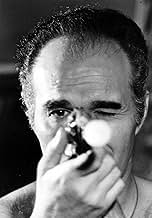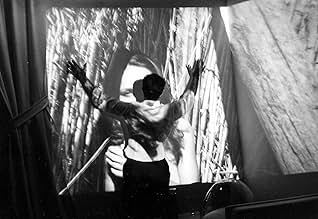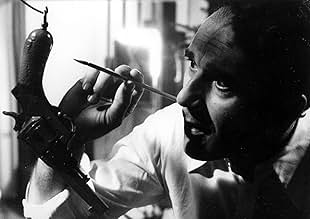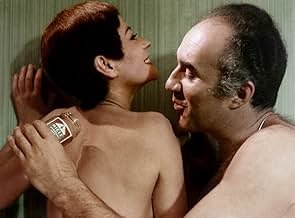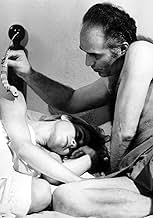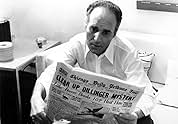AVALIAÇÃO DA IMDb
6,9/10
3 mil
SUA AVALIAÇÃO
Adicionar um enredo no seu idiomaA man decides to cook for himself, but finds the revolver of John Dillinger hidden in his kitchen instead.A man decides to cook for himself, but finds the revolver of John Dillinger hidden in his kitchen instead.A man decides to cook for himself, but finds the revolver of John Dillinger hidden in his kitchen instead.
- Direção
- Roteiristas
- Artistas
- Prêmios
- 1 vitória e 2 indicações no total
Avaliações em destaque
5pvsp
First i have to say, I didn't like this movie. Too "sixties" for me. During this years of fear, confusion ans sex liberation there were tons of experimental movies. This is one of them. So, if you like solid scripts and action, get way from this film.
This film is an experience like a David Lynch movie, very hypnotic and seducing if you are caught in it.
It's also a sequel - or a reply - to Jean-Luc Godard's "Le Mepris". First, there's Piccoli (sometimes he's dressed the same as in "Le Mepris") and there are many scenes who work as an echo of Godard's movie (the arguing scene, the jump in the sea...) Like a french critic said "Dillinger" is like "Le Mepris" with Brigitte Bardot on the first floor sleeping.
So, not a film as experimental and "destroy" as it seemed at first look. Unusual for sure but worth a look.
This film is an experience like a David Lynch movie, very hypnotic and seducing if you are caught in it.
It's also a sequel - or a reply - to Jean-Luc Godard's "Le Mepris". First, there's Piccoli (sometimes he's dressed the same as in "Le Mepris") and there are many scenes who work as an echo of Godard's movie (the arguing scene, the jump in the sea...) Like a french critic said "Dillinger" is like "Le Mepris" with Brigitte Bardot on the first floor sleeping.
So, not a film as experimental and "destroy" as it seemed at first look. Unusual for sure but worth a look.
Dillinger is Dead (Dillinger e Morto) is a Marco Ferreri film. I just saw the film in a very good print at the Museum of Modern Art in New York, and this is a film that benefits from being seen in a cinema where there are less distractions, and a film of this pace and sensibility has a better chance of seizing you and bringing you into its unique and power logic.
The film, in my estimation, is a meditation on alienation in a period of increasing mass media saturation. The film artfully weaves in a multitude of media moments, including television, home movies, radio, records, newsreels, and newspapers. At a certain point in watching the film, I deeply appreciated how Ferreri forces us to consider not only his character's relationship to media, but our own relationship to media. In his most expressive audio-visual moments, this film moves away from any standard narrative formula into a subjective exploration of the power of cinema and its affect on our psyche and our actions. At those moments, the film is visually mesmerizing, sonically engaging and psychologically intimate. One scene of a projected home movie on the wall of his living room is one of the best sequences of its sort that I have ever seen.
This film opens with Glauco (Michel Piccoli) at his job, testing gas masks. The conversation between Glauco and one of his co-workers that opens the film highlights the theme of alienation, and the film right from the beginning establishes a tone that engages the fate of man in a society of the spectacle.
The film then takes place over one night in the life of Glauco. We watch as he comes home and spurns a dinner that is waiting for him. He goes upstairs to his bedroom, where he has a brief, though telling, encounter with his wife, played by Anita Pallenberg. The bedroom scene begins to establish the basic strategy of Ferreri's film. There is very little dialog between Glauco and his wife (In fact, there is very little dialog in the film at all, it verges on being an almost non-dialog driven film). Instead, we, in the audience, bare witness to their interaction, and our feelings of what we are seeing are impacted by source music emanating from a radio that Glauco's wife is listening to (Most, thought not all, of the music used in the film is produced by known sources seen in the film). The music in the scene is mostly contemporary Italian pop music and American pop music. The songs lend an interesting narrative counterpoint to this scene (and is true in other scenes as well), as the music is usually expressive of the unspoken feelings and emotions between Glauco and his wife. When Glauco goes back downstairs, he begins to prepare his own meal, which actually turns out to be quite a production. When Glauco goes searching for a particular spice, he accidentally knocks down a stack of old magazines in the spice closet, and a mysterious package, wrapped in newspaper, spills onto the floor. In one of Ferreri's most deft storytelling touches, the content of that package and Glauco's reaction to it, becomes a structuring element for this film. But it is clear that Ferreri's passion here is not some genre formula film, rather the film is an essayistic exploration of alienation, told through a seemingly simple night in the life of Glauco.
The performances in this film are uniformly excellent, beginning with Piccoli's lead performance that carries the film. Pallenberg isn't given much screen time, but she does a good job in a limited part. But Glauco's maid, played by Annie Girardot, has a couple of great scenes that add a juicy spark to this tale.
In fact, while the film does move in its own way towards a conclusion, I found a short moment when Glauco stops in front of a poster celebrating Italian Futurists to be very telling of Ferreri's intentions. The Futurists were obsessed with speed, and modernity, and cinema, and their manifestos would hold much appeal for a character such as Glauco. But it is clear in Dillinger is Dead how much has changed since the 1930s when modernity seemed to hold unchecked promises. By the end of the 1960s, that type of Utopian celebration of modernity was no longer as easy to summon. The society of the spectacle was beginning to encroach on all aspects of everyday life, and in a character like Glauco, in the depths of his alienation, we see that the line between fantasy and reality in our culture was already well on its way to eroding by the end of the 1960s.
The film, in my estimation, is a meditation on alienation in a period of increasing mass media saturation. The film artfully weaves in a multitude of media moments, including television, home movies, radio, records, newsreels, and newspapers. At a certain point in watching the film, I deeply appreciated how Ferreri forces us to consider not only his character's relationship to media, but our own relationship to media. In his most expressive audio-visual moments, this film moves away from any standard narrative formula into a subjective exploration of the power of cinema and its affect on our psyche and our actions. At those moments, the film is visually mesmerizing, sonically engaging and psychologically intimate. One scene of a projected home movie on the wall of his living room is one of the best sequences of its sort that I have ever seen.
This film opens with Glauco (Michel Piccoli) at his job, testing gas masks. The conversation between Glauco and one of his co-workers that opens the film highlights the theme of alienation, and the film right from the beginning establishes a tone that engages the fate of man in a society of the spectacle.
The film then takes place over one night in the life of Glauco. We watch as he comes home and spurns a dinner that is waiting for him. He goes upstairs to his bedroom, where he has a brief, though telling, encounter with his wife, played by Anita Pallenberg. The bedroom scene begins to establish the basic strategy of Ferreri's film. There is very little dialog between Glauco and his wife (In fact, there is very little dialog in the film at all, it verges on being an almost non-dialog driven film). Instead, we, in the audience, bare witness to their interaction, and our feelings of what we are seeing are impacted by source music emanating from a radio that Glauco's wife is listening to (Most, thought not all, of the music used in the film is produced by known sources seen in the film). The music in the scene is mostly contemporary Italian pop music and American pop music. The songs lend an interesting narrative counterpoint to this scene (and is true in other scenes as well), as the music is usually expressive of the unspoken feelings and emotions between Glauco and his wife. When Glauco goes back downstairs, he begins to prepare his own meal, which actually turns out to be quite a production. When Glauco goes searching for a particular spice, he accidentally knocks down a stack of old magazines in the spice closet, and a mysterious package, wrapped in newspaper, spills onto the floor. In one of Ferreri's most deft storytelling touches, the content of that package and Glauco's reaction to it, becomes a structuring element for this film. But it is clear that Ferreri's passion here is not some genre formula film, rather the film is an essayistic exploration of alienation, told through a seemingly simple night in the life of Glauco.
The performances in this film are uniformly excellent, beginning with Piccoli's lead performance that carries the film. Pallenberg isn't given much screen time, but she does a good job in a limited part. But Glauco's maid, played by Annie Girardot, has a couple of great scenes that add a juicy spark to this tale.
In fact, while the film does move in its own way towards a conclusion, I found a short moment when Glauco stops in front of a poster celebrating Italian Futurists to be very telling of Ferreri's intentions. The Futurists were obsessed with speed, and modernity, and cinema, and their manifestos would hold much appeal for a character such as Glauco. But it is clear in Dillinger is Dead how much has changed since the 1930s when modernity seemed to hold unchecked promises. By the end of the 1960s, that type of Utopian celebration of modernity was no longer as easy to summon. The society of the spectacle was beginning to encroach on all aspects of everyday life, and in a character like Glauco, in the depths of his alienation, we see that the line between fantasy and reality in our culture was already well on its way to eroding by the end of the 1960s.
Although idiosyncratic and decidedly off beat, Marco Ferreri realised the importance of star names and following the international success of this, his first film to feature Michel Piccoli, the actors who entrusted themselves to his direction were not only extremely talented but like Piccoli were not afraid to push the boundaries and take chances. Of course Piccoli's inherent quirkiness makes him ideal casting whilst the emphasis in this on mundane domestic activity might be tedious were it not for his mesmerising performance.
As an avowed communist Ferreri's films became even more anarchic as time went on but here the anarchy is more controlled and is essentially a study in alienation, the entrapment of Marriage and the way in which so-called technological advances merely serve to repress the human spirit.
Anton Chekhov's maxim that once a gun is introduced it must at some stage inevitably go off is realised to devastating effect here and the low-key, almost clinical way in which the weapon is eventually used still shocks fifty years on.
Piccoli is supported by the equally quirky and courageous Annie Girardot as his obliging maid and as his wife the delectable Anita Pallenburg who has been used on the poster as the film's 'come on'.
This director's most famous (and infamous) opus is 'La Grande Bouffe' but there are many who consider this earlier work to be his greatest achievement.
Looking at Ferreri's depictions of urban angst calls to mind Thoreau's 'The mass of men lead lives of quiet desperation.'
As an avowed communist Ferreri's films became even more anarchic as time went on but here the anarchy is more controlled and is essentially a study in alienation, the entrapment of Marriage and the way in which so-called technological advances merely serve to repress the human spirit.
Anton Chekhov's maxim that once a gun is introduced it must at some stage inevitably go off is realised to devastating effect here and the low-key, almost clinical way in which the weapon is eventually used still shocks fifty years on.
Piccoli is supported by the equally quirky and courageous Annie Girardot as his obliging maid and as his wife the delectable Anita Pallenburg who has been used on the poster as the film's 'come on'.
This director's most famous (and infamous) opus is 'La Grande Bouffe' but there are many who consider this earlier work to be his greatest achievement.
Looking at Ferreri's depictions of urban angst calls to mind Thoreau's 'The mass of men lead lives of quiet desperation.'
Ferreri is one of the most important filmmakers, of the greatful decade like 60 in italy. Like Fellini or Pasolini, the director turn the movie in a dreamly journey to the fears and fantasies of the audience. The initial trip, when Piccoli drive a car, and the transformation of guns in art objects are very disquieting. An subversive idea. But, the most amazing is the influence of an old newspaper (the title is: Dillinger is dead)in the attitude of the protagonist. Phoenomenon similar to Lynch's inexplicable possessions. The first step for being seduced by Ferreri´s images.
10tuco73
An excellent movie, experimental in its unusual construction of an apparently very simple plot, edited in a really original and clever way, till its paradoxal and genial end. Not a movie for everybody's tastes, apparently not much happens in it, except a couple of decisions made by main character Michel Piccoli... but if you like what they call the European cinema (not Hollywood money-machine stupid blockbusters) you shall not miss this one! A five stars rating!
Você sabia?
- CuriosidadesThe interiors shown in the film are almost entirely those of the apartment once belonged to Italian Postmodern artist Mario Schifano. Some of his paintings can be seen hanging on the walls of the house. The kitchen scenes were shot into a country villa belonged to actor Ugo Tognazzi, good friend with director Marco Ferreri and frequently cast in his films.
- Erros de gravaçãoHe is 'cooking' in an empty saucepan; the spatula is clean and dry.
- ConexõesEdited into Spisok korabley (2008)
Principais escolhas
Faça login para avaliar e ver a lista de recomendações personalizadas
- How long is Dillinger Is Dead?Fornecido pela Alexa
Detalhes
- Data de lançamento
- País de origem
- Idioma
- Também conhecido como
- Dillinger Is Dead
- Locações de filme
- Palazzo ENI, Roma, Lazio, Itália(opening sequence)
- Empresas de produção
- Consulte mais créditos da empresa na IMDbPro
- Tempo de duração1 hora 35 minutos
- Mixagem de som
- Proporção
- 1.37 : 1
Contribua para esta página
Sugerir uma alteração ou adicionar conteúdo ausente

Principal brecha
By what name was Dillinger Morreu (1969) officially released in India in English?
Responda


